Zachary Garrett
Communication-Efficient Language Model Training Scales Reliably and Robustly: Scaling Laws for DiLoCo
Mar 12, 2025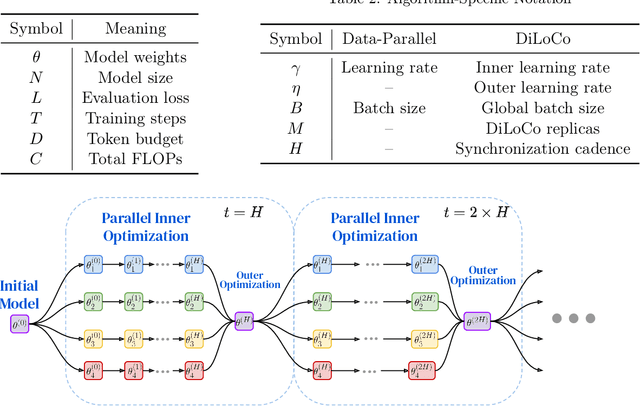
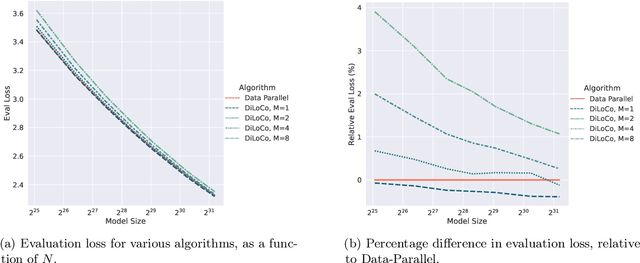
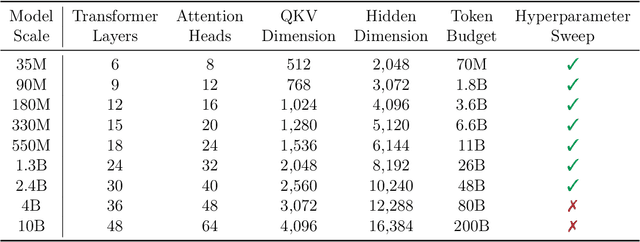
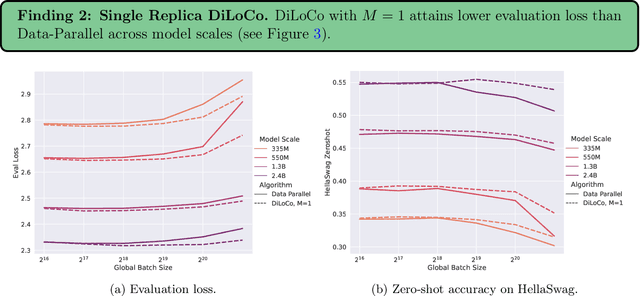
Abstract:As we scale to more massive machine learning models, the frequent synchronization demands inherent in data-parallel approaches create significant slowdowns, posing a critical challenge to further scaling. Recent work develops an approach (DiLoCo) that relaxes synchronization demands without compromising model quality. However, these works do not carefully analyze how DiLoCo's behavior changes with model size. In this work, we study the scaling law behavior of DiLoCo when training LLMs under a fixed compute budget. We focus on how algorithmic factors, including number of model replicas, hyperparameters, and token budget affect training in ways that can be accurately predicted via scaling laws. We find that DiLoCo scales both predictably and robustly with model size. When well-tuned, DiLoCo scales better than data-parallel training with model size, and can outperform data-parallel training even at small model sizes. Our results showcase a more general set of benefits of DiLoCo than previously documented, including increased optimal batch sizes, improved downstream generalization with scale, and improved evaluation loss for a fixed token budget.
Streaming DiLoCo with overlapping communication: Towards a Distributed Free Lunch
Jan 30, 2025Abstract:Training of large language models (LLMs) is typically distributed across a large number of accelerators to reduce training time. Since internal states and parameter gradients need to be exchanged at each and every single gradient step, all devices need to be co-located using low-latency high-bandwidth communication links to support the required high volume of exchanged bits. Recently, distributed algorithms like DiLoCo have relaxed such co-location constraint: accelerators can be grouped into ``workers'', where synchronizations between workers only occur infrequently. This in turn means that workers can afford being connected by lower bandwidth communication links without affecting learning quality. However, in these methods, communication across workers still requires the same peak bandwidth as before, as the synchronizations require all parameters to be exchanged across all workers. In this paper, we improve DiLoCo in three ways. First, we synchronize only subsets of parameters in sequence, rather than all at once, which greatly reduces peak bandwidth. Second, we allow workers to continue training while synchronizing, which decreases wall clock time. Third, we quantize the data exchanged by workers, which further reduces bandwidth across workers. By properly combining these modifications, we show experimentally that we can distribute training of billion-scale parameters and reach similar quality as before, but reducing required bandwidth by two orders of magnitude.
FAX: Scalable and Differentiable Federated Primitives in JAX
Mar 11, 2024



Abstract:We present FAX, a JAX-based library designed to support large-scale distributed and federated computations in both data center and cross-device applications. FAX leverages JAX's sharding mechanisms to enable native targeting of TPUs and state-of-the-art JAX runtimes, including Pathways. FAX embeds building blocks for federated computations as primitives in JAX. This enables three key benefits. First, FAX computations can be translated to XLA HLO. Second, FAX provides a full implementation of federated automatic differentiation, greatly simplifying the expression of federated computations. Last, FAX computations can be interpreted out to existing production cross-device federated compute systems. We show that FAX provides an easily programmable, performant, and scalable framework for federated computations in the data center. FAX is available at https://github.com/google-research/google-research/tree/master/fax .
Leveraging Function Space Aggregation for Federated Learning at Scale
Nov 17, 2023
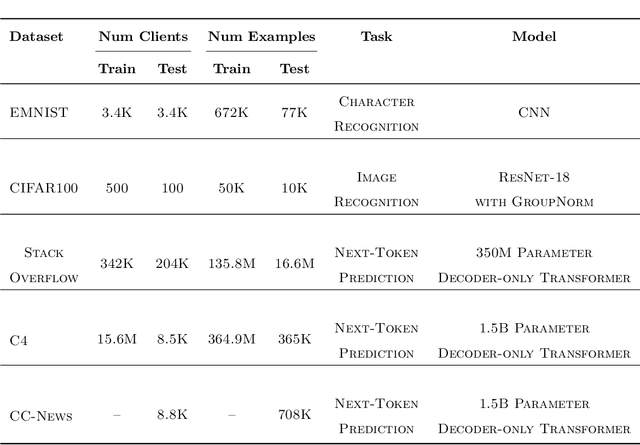
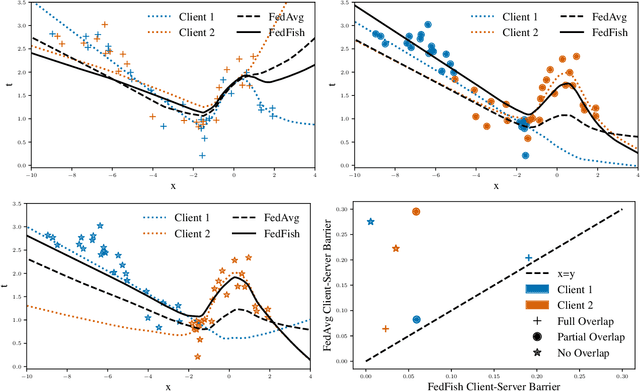
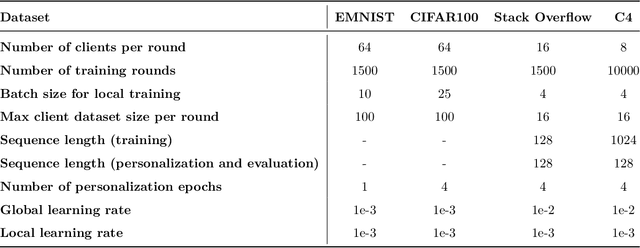
Abstract:The federated learning paradigm has motivated the development of methods for aggregating multiple client updates into a global server model, without sharing client data. Many federated learning algorithms, including the canonical Federated Averaging (FedAvg), take a direct (possibly weighted) average of the client parameter updates, motivated by results in distributed optimization. In this work, we adopt a function space perspective and propose a new algorithm, FedFish, that aggregates local approximations to the functions learned by clients, using an estimate based on their Fisher information. We evaluate FedFish on realistic, large-scale cross-device benchmarks. While the performance of FedAvg can suffer as client models drift further apart, we demonstrate that FedFish is more robust to longer local training. Our evaluation across several settings in image and language benchmarks shows that FedFish outperforms FedAvg as local training epochs increase. Further, FedFish results in global networks that are more amenable to efficient personalization via local fine-tuning on the same or shifted data distributions. For instance, federated pretraining on the C4 dataset, followed by few-shot personalization on Stack Overflow, results in a 7% improvement in next-token prediction by FedFish over FedAvg.
Towards Federated Foundation Models: Scalable Dataset Pipelines for Group-Structured Learning
Jul 18, 2023Abstract:We introduce a library, Dataset Grouper, to create large-scale group-structured (e.g., federated) datasets, enabling federated learning simulation at the scale of foundation models. This library allows the creation of group-structured versions of existing datasets based on user-specified partitions, and directly leads to a variety of useful heterogeneous datasets that can be plugged into existing software frameworks. Dataset Grouper offers three key advantages. First, it scales to settings where even a single group's dataset is too large to fit in memory. Second, it provides flexibility, both in choosing the base (non-partitioned) dataset and in defining partitions. Finally, it is framework-agnostic. We empirically demonstrate that Dataset Grouper allows for large-scale federated language modeling simulations on datasets that are orders of magnitude larger than in previous work. Our experimental results show that algorithms like FedAvg operate more as meta-learning methods than as empirical risk minimization methods at this scale, suggesting their utility in downstream personalization and task-specific adaptation.
Federated Automatic Differentiation
Jan 18, 2023

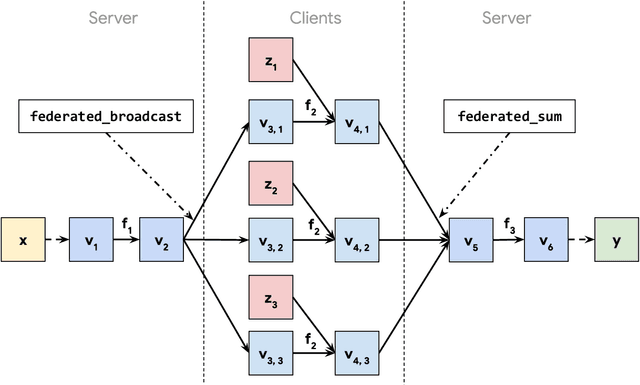

Abstract:Federated learning (FL) is a general framework for learning across heterogeneous clients while preserving data privacy, under the orchestration of a central server. FL methods often compute gradients of loss functions purely locally (ie. entirely at each client, or entirely at the server), typically using automatic differentiation (AD) techniques. We propose a federated automatic differentiation (FAD) framework that 1) enables computing derivatives of functions involving client and server computation as well as communication between them and 2) operates in a manner compatible with existing federated technology. In other words, FAD computes derivatives across communication boundaries. We show, in analogy with traditional AD, that FAD may be implemented using various accumulation modes, which introduce distinct computation-communication trade-offs and systems requirements. Further, we show that a broad class of federated computations is closed under these various modes of FAD, implying in particular that if the original computation can be implemented using privacy-preserving primitives, its derivative may be computed using only these same primitives. We then show how FAD can be used to create algorithms that dynamically learn components of the algorithm itself. In particular, we show that FedAvg-style algorithms can exhibit significantly improved performance by using FAD to adjust the server optimization step automatically, or by using FAD to learn weighting schemes for computing weighted averages across clients.
A Field Guide to Federated Optimization
Jul 14, 2021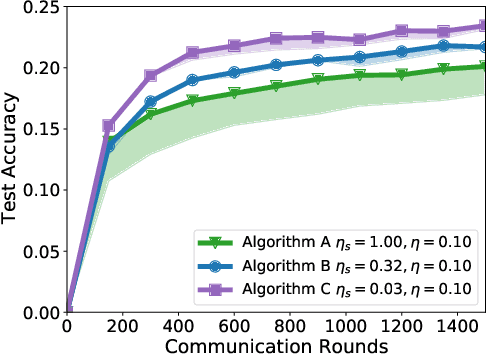



Abstract:Federated learning and analytics are a distributed approach for collaboratively learning models (or statistics) from decentralized data, motivated by and designed for privacy protection. The distributed learning process can be formulated as solving federated optimization problems, which emphasize communication efficiency, data heterogeneity, compatibility with privacy and system requirements, and other constraints that are not primary considerations in other problem settings. This paper provides recommendations and guidelines on formulating, designing, evaluating and analyzing federated optimization algorithms through concrete examples and practical implementation, with a focus on conducting effective simulations to infer real-world performance. The goal of this work is not to survey the current literature, but to inspire researchers and practitioners to design federated learning algorithms that can be used in various practical applications.
On Large-Cohort Training for Federated Learning
Jun 15, 2021

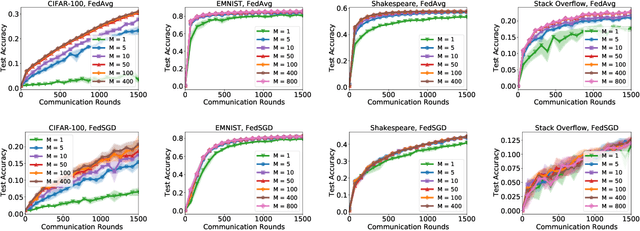
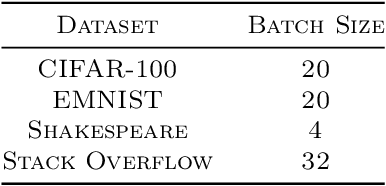
Abstract:Federated learning methods typically learn a model by iteratively sampling updates from a population of clients. In this work, we explore how the number of clients sampled at each round (the cohort size) impacts the quality of the learned model and the training dynamics of federated learning algorithms. Our work poses three fundamental questions. First, what challenges arise when trying to scale federated learning to larger cohorts? Second, what parallels exist between cohort sizes in federated learning and batch sizes in centralized learning? Last, how can we design federated learning methods that effectively utilize larger cohort sizes? We give partial answers to these questions based on extensive empirical evaluation. Our work highlights a number of challenges stemming from the use of larger cohorts. While some of these (such as generalization issues and diminishing returns) are analogs of large-batch training challenges, others (including training failures and fairness concerns) are unique to federated learning.
Local Adaptivity in Federated Learning: Convergence and Consistency
Jun 04, 2021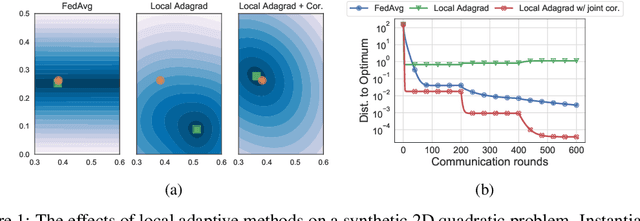

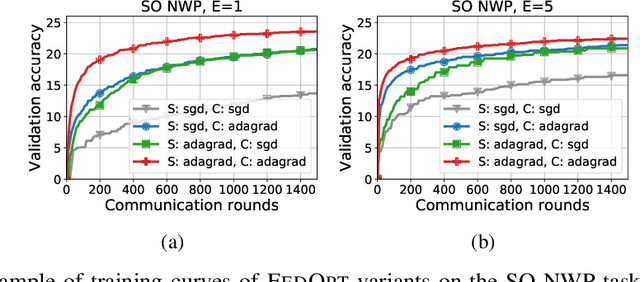

Abstract:The federated learning (FL) framework trains a machine learning model using decentralized data stored at edge client devices by periodically aggregating locally trained models. Popular optimization algorithms of FL use vanilla (stochastic) gradient descent for both local updates at clients and global updates at the aggregating server. Recently, adaptive optimization methods such as AdaGrad have been studied for server updates. However, the effect of using adaptive optimization methods for local updates at clients is not yet understood. We show in both theory and practice that while local adaptive methods can accelerate convergence, they can cause a non-vanishing solution bias, where the final converged solution may be different from the stationary point of the global objective function. We propose correction techniques to overcome this inconsistency and complement the local adaptive methods for FL. Extensive experiments on realistic federated training tasks show that the proposed algorithms can achieve faster convergence and higher test accuracy than the baselines without local adaptivity.
Federated Reconstruction: Partially Local Federated Learning
Feb 18, 2021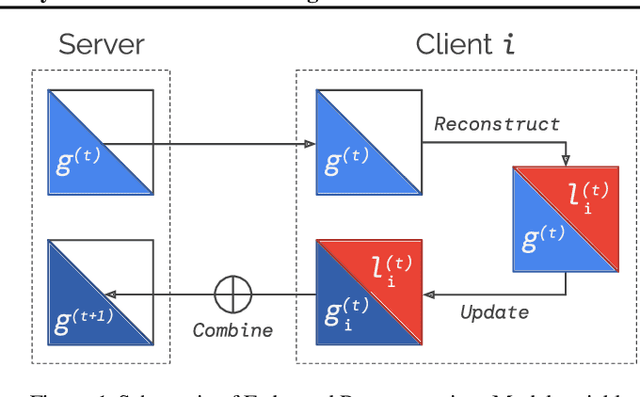
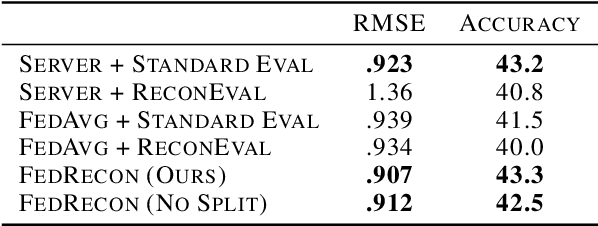
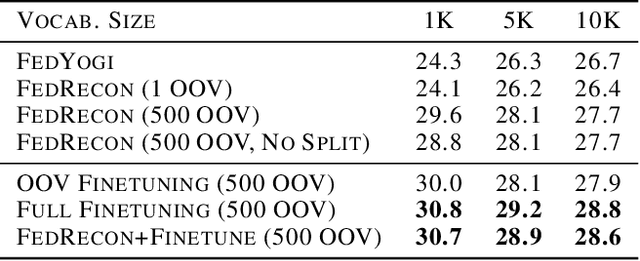
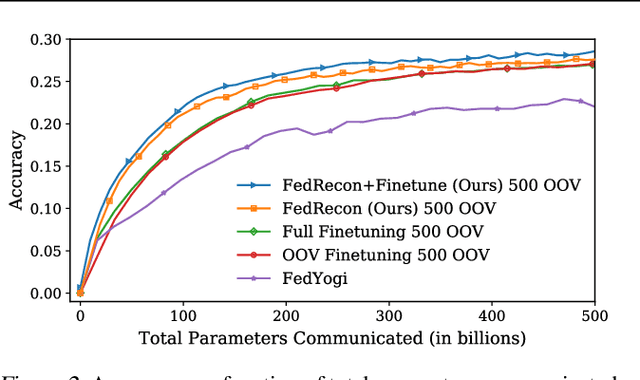
Abstract:Personalization methods in federated learning aim to balance the benefits of federated and local training for data availability, communication cost, and robustness to client heterogeneity. Approaches that require clients to communicate all model parameters can be undesirable due to privacy and communication constraints. Other approaches require always-available or stateful clients, impractical in large-scale cross-device settings. We introduce Federated Reconstruction, the first model-agnostic framework for partially local federated learning suitable for training and inference at scale. We motivate the framework via a connection to model-agnostic meta learning, empirically demonstrate its performance over existing approaches for collaborative filtering and next word prediction, and release an open-source library for evaluating approaches in this setting. We also describe the successful deployment of this approach at scale for federated collaborative filtering in a mobile keyboard application.
 Add to Chrome
Add to Chrome Add to Firefox
Add to Firefox Add to Edge
Add to Edge